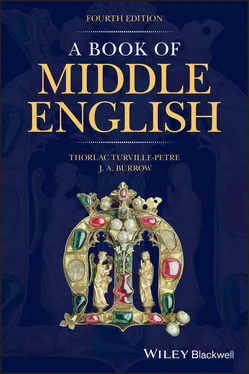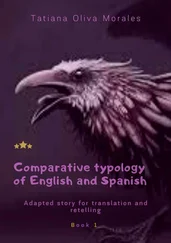8.4 False Friends
8.4.1 ‘lewd’
A trap for the unwary in Middle English is a ‘false friend’, that is, a familiar word that has undergone semantic change. A clear example is stout , where the change in meaning has been so dramatic that the context will usually make it obvious that its modern sense is not applicable. Another instance is lewd , a word that Trevisa uses repeatedly in his Dialogue , though not in its current sense of ‘sexually offensive’. To understand what Trevisa means by it, we need to follow the semantic development of the word, which OED sets out clearly in seven steps. In Old English lwede referred to someone who was not a cleric but a layman, a sense surviving into Middle English (sense 1). Since to be a cleric was, supposedly, to be trained and specifically to know Latin, a lewd person was unlearned, in a non‐judgemental sense someone who did not know Latin, a sense first recorded early in the thirteenth century (2). But this had social implications, because knowledge of Latin distinguished not only the clergy but also all those with access to education, so that to be lewd indicated lower social status (3). At this point, inevitably, the implications of the word go downhill: a lewed person is an ignorant one, regardless of social status, often wilfully ignorant (4); and hence, more generally, a wicked person (5). It could also be applied to objects, bad or worthless (6), and finally to lascivious people or behaviour (7). OED cites senses 3–7 from the later fourteenth century, often from Chaucer, so its first citation of the modern sense ‘lascivious’ is the Reeve’s outraged reprimand to the Miller: ‘Lat be thy lewed dronken harlotrye!’ ( Canterbury Tales 1.3145). MED , however, gives the definition, ‘coarse, crude’, since neither lewed nor harlotrye , ‘scurrilous story’, necessarily has sexual implications. The Reeve’s objection is to a tale that brings someone into disrepute, though indeed it does, as it turns out, involve quite a lot of sex. However, MED ’s entry for lewd is less easy to find and to navigate. A search for the common spelling lewed among the headwords will not find it, since ‐w‐ is spelt ‐u‐ in the headwords, so it is listed as leued . Its senses are grouped rather counter‐intuitively under two main headings. Unhelpfully, there is an entirely separate entry for leued man , which is more sensibly integrated in OED .
Who, then, is the ‘lewed man’ (12/72) that the Lord refers to in his discussion with the Clerk? To answer that question we need to follow the Lord’s argument, which focusses on the need for translation from Latin. Although the ‘lewed man’ ‘understondeþ no Latyn’ (70), the Clerk argues he can be informed of the contents of Latin works by those who are able to read them. The Lord points to the flaw in this answer, for the ‘lewed man’ does not know what information he ought to ask for, ‘especially about the knowledge of events that never entered his mind’ (72–4). The Lord thus expresses sympathy for the ‘lewed man’ and his needs, so that the derogatory senses of lewed are inappropriate here. The Clerk has argued snootily that such people ‘may lerne and understonde’ (52), to which the Lord objects that this is impossible for those who are too busy, or too old, or too unintelligent, or without funds to pay for schooling (54–7). So lewed encompasses all who, for one reason or another, are unable to learn Latin, those occupied in worldly business as well as the poorer classes of society.
The context of the word on the page gives vital information for its interpretation. In this case there is a wider context that can usefully be considered. Trevisa’s preface to his translation of the Polychronicon is an advertisement for the work, positioning the potential readership who will recognize themselves as ‘lewed men’. Clearly derogatory senses can therefore be ruled out here: it does not do to disparage your audience. In fact those who commissioned the surviving huge manuscripts of Trevisa’s Polychronicon prefaced by the Dialogue were evidently from the upper echelons of society who could afford the major outlay required. To capture all of these implications in a single modern word is indeed a challenge, since the meanings of the word are embedded in its social and historical situation, in the relative status of Latin and English in the late fourteenth century.
The Lord becomes exasperated by the Clerk’s obtuseness, and now launches into a clever denunciation. Clerk , too, has a range of associated senses: firstly it refers to a cleric, therefore an educated and learned man, one trained to read and write Latin, a student, and thence one employed as a secretary ( MED clerk , senses 1–3; and see note to 14j/17 in this book). The Lord himself uses clerkes to refer to wise men (138). The expression ‘both clerk and lewed’ means ‘everyone’, since they are antonyms. It follows that to accuse the Clerk of being lewed is a major insult, as when, in a resoundingly alliterative and metaphorical phrase, the Lord describes the Clerk’s argument as ‘worþy to be plonged yn a plod and leyd in pouþer of lewednes and of schame’ (81–2) – ‘fit to be plunged into a muddy puddle and placed in a powder of lewednes and of disgrace’. So here lewed , coupled with schame takes on a strongly derogatory sense. Not content with this derisory comment, the Lord insults the Clerk by describing his argument as ‘lewed reson’ (96, 106). Furthermore he maintains that to deliver a sermon in Latin to a congregation who only knew English would be ‘a lewed dede’ (100). Does the Clerk, asks the Lord rhetorically, really suppose that learned men were lewedlych occupied when they translated the Bible? In his Dialogue we see how Trevisa takes delight in playing with the semantic range of lewed .
The noun kind (from OE) means ‘nature, species, sort’, as now, and the adjective kynde is related to the noun, originally meaning ‘natural, in accord with innate nature or kind’. It is a word rich in significance in Piers Plowman , especially in the semi‐personification Kynde Wit, ‘natural understanding’ who at one point teaches Piers how to prepare for his pilgrimage (7b/59): it is the innate understanding of right and wrong that belongs to all. Langland also uses the phrase ‘of kynde understondyng’ (7a/56), which has been variously interpreted. The basic idea is still ‘what is natural to humans’; here we take the phrase to mean ‘as is commonly agreed’: it is generally understood, says Will, that clerics should not testify in a lay court since they have their own ecclesiastical courts. In one stanza of Pearl (10/265–76) the poet plays on the noun and adjective: kynde decreed that a rose should flower and die, says the Maiden to the Dreamer, but through the kynde of the chest enclosing it now, the rose has become a pearl. The Dreamer’s refusal to accept this shows he is ‘no kynde jueler’: taking its sense from the preceding nouns, the adjective implies that the jeweller‐dreamer is acting against the natural course of things, he is not ‘right‐minded’ in that he is ungenerous, ‘not grateful’. At Arthur’s New Year celebrations in Sir Gawain and the Green Knight the court is entertained with ‘kynde caroles’ (9/473), and here the sense is ‘fitting, appropriate to the season’, what comes naturally and properly. Finally, the repentant sinner in a lyric acknowledges that Christ’s redeeming love ‘Min herte it þerlede, ʒef I wer kende’ – ‘would pierce my heart if I were kind ’ (14r/19). This approaches the modern sense, ‘kind, grateful’, but still the primary meaning is ‘having natural feelings’.
Читать дальше












